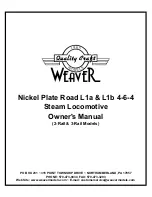
9
Station or a Mobile Station with its UID.
• Name set at the factory:
WGmh 824, DB
Programming
• The characteristics can be programmed using the graph
-
ic screen on the Central Station or also partially with the
Mobile Station.
• All of the Configuration Variables (CV) can be read and
programmed repeatedly.
• The programming can be done either on the main track or
the programming track.
• The default settings (factory settings) can be produced
repeatedly.
• Function mapping: Functions can be assigned to any of
the function buttons with the help of the 60212 Central
Station (with limitations) and with the 60213/60214/60215
Central Station (See help section in the Central Station).
DCC Protocol
Addresses
• Possible addresses: short, long, and m.u. address
• Address range:
1 – 127 (short address, m.u. address)
1 – 10239 (long address)
• Every address can be programmed manually.
• A short or a long address is selected using the CVs.
• A multiple unit address that is being used deactivates the
standard address.
Programming
• The characteristics can be changed repeatedly using the
Configuration Variables (CV).
• The CV numbers and the CV values are entered directly.
• The CVs can be read and programmed repeatedly. (Pro
-
gramming is done on the programming track.)
• The CVs can be programmed, as you desire. PoM (Pro
-
gramming on the layout track) is only possible with those
CVs marked in the CV table. PoM must be supported by
your central controller (see the instructions for your con
-
troller).
• The default settings (factory settings) can be produced
repeatedly.
• 14 or 28/126 speed levels can be set.
The speed levels on the locomotive decoder and on the
controller must agree with each other; otherwise, you
may have malfunctions.
• All of the functions can be controlled according to the
function mapping (see CV description).
• See the CV description for the DCC protocol for additional
information.
We recommend that in general programming should be
done on the programming track.










































